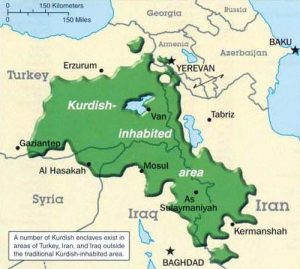By Sarah-Claire Jordan
 Kurdish is most commonly known as the language of the Kurds, an ethnic group originating in the Middle East. Kurds can be found in parts of Iran, Turkey, Iraq, and Syria, but the only place where Kurdish is an official language is Iraq. The area where most Kurds live is called Kurdistan, though it is not recognized as a country of its own even though the area was inhabited by Kurds long before any other group.
Kurdish is most commonly known as the language of the Kurds, an ethnic group originating in the Middle East. Kurds can be found in parts of Iran, Turkey, Iraq, and Syria, but the only place where Kurdish is an official language is Iraq. The area where most Kurds live is called Kurdistan, though it is not recognized as a country of its own even though the area was inhabited by Kurds long before any other group.
Kurds have faced a long history of discrimination, which has made their identity as a people even stronger. They fiercely defend their right to speak Kurdish if possible and are generally very proud of their origins and perseverance as a people. Here are a few things that everyone should know about the Kurdish language:
1. Kurdish is split into three dialects
Kurdish is considered to be a dialect continuum, meaning a spectrum of dialects where those on either extreme are very different from one another, but ones that are closer or next to each other on the spectrum are very similar. That being said, linguists have categorized the dialects into three main groups: Northern Kurdish or Kurmanji, Southern Kurdish or Pehlewani, and Central Kurdish or Sorani. Kurmanji is the group with the largest number of speakers, ranging from 15 to 20 million. Sorani comes in second, with 6 to 7 million speakers, and Pehlewani is the smallest group with only about 3 million speakers.
2. It has been banned in many places
As mentioned earlier, Kurds have faced many years of discrimination, which often included (and still includes) banning of the Kurdish language. Though in Iraq it has the status of official language along with Arabic, in many other places the language is not treated that way. For example, Syria has banned the publishing of any material in Kurdish, though the war in the country is making the ban difficult to enforce. Turkey has a long history of discrimination against Kurds. Use of the Kurdish language was restricted in Turkey, to the point where it couldn’t be used in broadcasting or education, up until 2002. Just a few years ago, in 2006, Turkey finally allowed some Kurdish programs to be aired on certain television channels, but still with many restrictions. 2009 saw some relaxation in terms of those television restrictions in Turkey.
3. Kurdish has been written using four different systems over the years
Since speakers and writers of Kurdish faced restrictions practically anywhere they were, a uniquely Kurdish alphabet has never been adopted. Kurdish writers use Latin script, Arabic script, and even the Cyrillic alphabet, depending on which region they live in. Linguists have developed a Kurdish alphabet called Yekgirtú, and the proposal for its adoption has been submitted, but nothing has happened since its submission.
Though the Kurds do not have the luxury of having their own country recognized by the rest of the world, their language is becoming more accepted in placed where it was previously banned. Alpha Omega Translations understands the importance of translating and distributing material of any kind in languages that are facing prohibition and other kinds of discrimination in parts of the world. Everyone deserves to be able to read, write, listen, and speak in their native language, and Alpha Omega Translations is dedicated to that goal.
For an overview of our translation expertise, visit our website translation and localization page.



